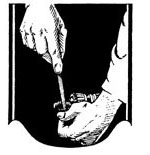
St. Cyprian on Schism: A Patristic Reality Check
GUEST COLUMN
Patristics, the study of the writings of the early Church Fathers, is a valuable tool. It enables Christians to perform reality checks with regard to certain popular beliefs or tenets. This patristic check is critical in order to weed out theological innovations that, although intellectually attractive, may directly conflict with the faith as handed down from Christ through the Apostles from the earliest days of Christianity.
The writings of St. Cyprian (A.D. 200-258) provide one such check. Born into a wealthy pagan family in North Africa, Cyprian led a dissipated life before converting to Christianity at the age of thirty-five. In short order, he was made a priest and then elected bishop of Carthage around A.D. 248. During this period, he became familiar with the theology of Tertullian, who did not believe that God’s forgiveness extended to those who abjured their Christian faith during the Roman persecutions.
In the mysterious ways of God’s providence, Cyprian ascended to the bishop’s throne just prior to two of these Roman persecutions — those of Emperor Decius (A.D. 250) and Emperor Valerian (A.D. 257-258). Cyprian chose to flee Carthage during Decius’s reign so that he could continue to lead the Church, causing resentment among some of his priests. Upon his return to Carthage, Cyprian encountered a Church divided on the question of what to do with the Christians who had “fallen away,” or renounced the faith, during Decius’s persecution and now sought to return to the fold. They were known as the lapsi (the lapsed or fallen). Cyprian’s remedy veered from the path chosen by Novatian, a Tertullian-inspired anti-pope whose reluctance to forgive the lapsi led him out of the Church. Novatian established his own rival sect based on this rigorist mentality and consecrated his own bishops throughout Christendom. Cyprian, on the other hand, although severe, was not inflexible; he granted the lapsi the possibility of forgiveness after they demonstrated “exemplary repentance,” including public acts of penance.
Cyprian delivered De Ecclesiae Catholicae Unitate (“On the Unity of the Church”) during a council he convened in A.D. 251 to counter the Novatians and settle the controversy over the reconciliation of the lapsi. This treatise is a fascinating early pastoral exposition in which a sitting bishop directly addresses schism, including how dissidents can insinuate themselves among the faithful, how Christians can avoid falling into schism, and how separation from the Church is a worse offense than the actions of the lapsi. St. Cyprian’s tone throughout the document is measured yet firm. Those who read “On the Unity of the Church” today can profit from Cyprian’s thoughts and reflections, which, although ancient, are as valid now as they were when he first inked them. This is true especially for nominal Catholics who refuse to assent to Catholic faith and morals, and others who, out of ignorance or hurt, have abandoned the Barque of Peter for unseaworthy vessels of other faiths.
You May Also Enjoy
Anne Barbeau Gardiner takes on an author who has "made a career of treating the Bible sacrilegiously" and sees power, not Logos, as the ultimate reality.
In decades past there was a reluctance on the part of Latin American Christians committed to “a preferential option for the poor" to criticize the Soviet Union.
Homosexuality is one of the most explosive issues of the day, and the polarization it causes at times exceeds even that of abortion.

